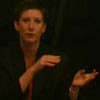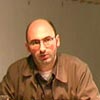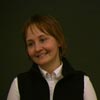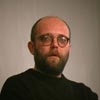Strategies of Presentation I
LECTURERS
 ClÚmentine Deliss
ClÚmentine Deliss
Is an independent curator and publisher who lives in London. She currently
works for Chelsea College of Art & Design. She has held professorships
and visiting lectureships at several art academies in Europe including
the National Academy of Fine Arts, Oslo, the fine art academies of Stockholm,
Malm÷, and Copenhagen, and the Stńdelschule, Frankfurt. From 1992-95,
she was the artistic director of africa95, a festival of contemporary
arts from Africa produced in conjunction with the Royal Academy of Arts,
London, and over 60 UK institutions. Since 1996, she has produced Metronome,
a writers' and artists' organ in Dakar, London, Berlin, Basel, Frankfurt,
Vienna, Bordeaux, Biella, Oslo, Copenhagen, and Stockholm. Amongst others
she also curated the following projects: Lotte or the transformation of
the object (Styrian Autumn 1990), africa95 (1995), Seven
Stories about Modern Art in Africa (Whitechapel, 1990), Tempolabor,
a libertine laboratory? (Kunsthalle Basel, 1998), Bureau d'Esprit
(Cittadellarte, Fondazione Pistoletto, 1999), Magnetic Speech
(1999/2000) and The Queel (CCAD and Tate Britain, 2002).
Branislav DimitrijeviŠ (1967)
Is
an art historian, writer and curator working for the Centre for Contemporary
Arts - Belgrade, where he is the Head of the Department for Education
and Documentation.
He graduated from History of Art at the University of Belgrade, and in
1995 he received his MA degree in History and Theory of Art at the University
of Kent with professor Stephen Bann.
He has written texts on contemporary art and politics in Serbia for local
and international magazines and catalogues, and edited the book on interpretations
of popular imagery, Pop Vision in 1996. He has written essays for catalogues
of artists including Zoran Naskovski, Milica TomiŠ, Zdravko JoksimoviŠ,
pRT and others.
With Branislava AndjelkoviŠ he curated exhibitions and edited catalogues
such as Map Room (1995), Murder1 (1997), Beauty and terror (1998) and a site-specific show Overground (1998). He is one
of the founders of the School for History and Theory of Images at the
Centre for Contemporary Arts - Belgrade.
From 1999 onwards he teaches courses on Conceptual Art and Reading the
Image at the School for History and Theory of Images in Belgrade. He has
also held lectures at the Arts Academy in Belgrade and the Michaelis School
for Arts in Cape Town, RSA. He participated at conferences and panel discussions
in Canterbury, Stockholm, Innsbruck, Ljubljana, Skopje, Oslo, etc.
EuroVision2000 & labor k3000 Zurich
Susanne
Perin, Peter Spillmann and Marion von Osten, all of them artists from labor k3000 Zurich initiated EuroVision2000. Labor k3000 is a Media Space created for technology sharing, content exchange and
mutual forms of collective cultural practices. EuroVision2000 was
a temporary, open network of Media activists and artists from western,
central and south-eastern Europe. EuroVision2000 was created in
opposition to the actual EU politics on border, migration and asylum laws.
Debates and film screenings took place in Prague, Brussels and Bologna.
Mike Hentz (1954)
Polymeadia
artist. Works in visual arts, philosophy, media art, sculpture, installation,
events, performances, music. Produces publications and gives lectures.
He also develops multifunctional systems. He is the director of the Medusa
Festival in Poland. He participated at Documenta in 1986 and 1992.
He also teaches in art schools (Art Academy of Hamburg 1979-1997). He
is a co-founder of the following groups: minus Delta t (1978), Frigo and Code Public (1980) and he participated in the following
projects: University TV (1991), Van Gogh TV (1988), Ponton
(1986).
Marko
Ko╣nik (1961)
Member
of the Laibach group (1981-1983). In 1986 he founded the Egon March Institute
with the aim to gain and transmit knowledge in the field of new media
practice and theory. Within the frame of the Institute he directed and
produced most of his projects. In 1996 he initiated the Ministry for the
Experiment, an independent production unit for media projects in the frame
of Radio Student. A multimedia artist, author of scenarios, music, computer
programming and videos for performances, installations and multimedia
projects. A pioneer in European interactive communication projects. In
2000 he conceived and organised the international multimedia festival
Hexpo.
 Oliver
Marchart (1968)
Oliver
Marchart (1968)
Works
as a cultural and political theorist and as a lecturer at the Universities
of Vienna and Innsbruck. Author and editor of books on art, new media
and (cultural) politics.
 Olesya
Turkina
Olesya
Turkina
Works as a curator at the Contemporary Art department at The Russian State
Museum, St. Petersburg. She has curated numerous exhibitions, among them The Evolution of an Image: Light, Sound, Material at the State
Russian museum, St. Petersburg, 1996; Doctor and Patient. Memory and Amnesia,
Pori Art Museum, Finland, 1996; Kabinet, Stedelijk museum,
Amsterdam, 1997(co-curator); MIR:Made in the XXth century Russian
Pavillion at the 48th Venetian Biennale,1999.
She has published over 100 articles on contemporary art in various art
magazines (Khudozhestvennyi Zhurnal, Paradoxa, Cultural Studies, Kabinet,
Siksi) and catalogues (Europe, Kunst, Hannover, 1991; Manifesta
2,1998; After the Wall, Stockholm, 1999; Manifesta 3,
2000). She is also a contributor to Flash Art International and NU and
took part in many international conferences. She teaches 20th Century
art at the Baltic University of Economy, Ecology and Human Rights, St.
Petersburg, and at the Pro-Arte Institute, St. Petersburg.
 Miha Zadnikar (1962)
Miha Zadnikar (1962)
Is ethnologists and cultural sociologist. In the 1980's he operated mainly
as a journalist, essayist and lecturer in the field of cultural and artistic
- specialised mainly for music and film - criticism. He wrote for a number
of publications in Yugoslavia. At the time he still had some sporadic
hopes for institutions. With the declaration of Slovene independence he
focused his activities and become an independent social - political activist
- the problem of Metelkova as a whole, Intervention Bureau, etc. Today
he deals with club micro-sociology (he is the head of the program activity
at the Gromki Club, AKC centre Metelkova Mesto), the theory and organisation
of 'new' subcultures and underground, promotion and organisation of boarder-line
and overlooked musical practices (Cinema-ear at the Slovene cinema, 'Defony'
in Gromki). He regularly presents his endeavours on radio stations, in
publications (mainly the magazine Mladina) and is a lecturer at the Faculty
of Arts at the University of Ljubljana where he holds the subject Anthropology
and Sociology of Music.